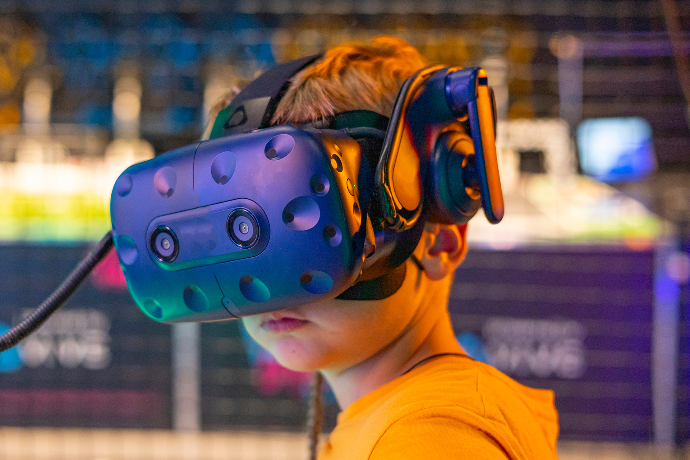Over the past few years, Virtual Reality (VR) and Augmented Reality (AR) technologies have rapidly evolved, paving the way for new and immersive experiences in the entertainment world. However, while both technologies share a foundation in creating rich visual landscapes, they differ in their approach and level of immersion.
Virtual Reality completely envelops users in a digitally simulated environment, typically accessed through dedicated headsets. VR allows the audience to explore and interact with 360-degree computer-generated worlds, providing a profound immersion that transcends traditional screen experiences.
On the other hand, Augmented Reality places digital information or objects on top of the user's real-world view, creating an enhanced experience that seamlessly merges the physical and digital realms. Accessible through various devices, like smartphones or AR glasses, AR has the potential to enrich everyday experiences while providing new forms of entertainment.
The entertainment industry has quickly embraced these emerging technologies, with filmmakers, game developers, and theatre professionals exploring VR and AR's unique possibilities for storytelling. The innovation potential is immense, from cinematic experiences that defy the constraints of the screen to interactive theatre performances that engage audiences in unprecedented ways.
In this blog post, we will explore how VR and AR are changing the way stories are told in film, television, and theatre, highlighting successful VR/AR storytelling projects and discussing Production City's efforts to foster the adoption of these technologies in the industry.
How VR/AR Is Changing the Way Stories Are Told in Film, Television, and Theatre

As storytellers continue to push the boundaries of their art, Virtual Reality and Augmented Reality technologies present a world of opportunities beyond conventional storytelling methods. Using VR and AR in film, television, and theatre has unlocked new dimensions of creativity, creating interactive and immersive narrative experiences previously unattainable.
One of the most significant benefits of incorporating VR and AR technologies into storytelling is the increased sense of immersion and presence for viewers. Directors and producers can create stories that hold the audience's attention and actively engage them, giving them a genuine feeling of being part of the narrative. This transformative shift can strengthen emotional connections between the audience and the story, promoting a deeper understanding and appreciation of the subject.
Moreover, VR and AR storytelling allows for exploring non-linear and branching narratives. In a traditional film or theatre experience, the story follows a set path from beginning to end. However, with VR/AR technologies, creators can give the audience control over the story's progression, opening up possibilities for multiple endings, perspectives, and parallel storylines. This level of interactivity encourages audiences to engage with the content and invest their time and emotions into the story.
Lastly, these technologies also create opportunities for collaboration between different forms of storytelling, like blending aspects of film, television, and theatre within a single experience. By breaking down the barriers between these mediums, creators can devise unique and innovative stories that might not fit into traditional formats, pushing the boundaries of what's possible in entertainment.
The groundbreaking design of **Production City** is at the forefront of this technological revolution, supporting creators in developing and realising their VR/AR storytelling projects. With a commitment to fostering creativity and exploring the potential of immersive narrative experiences, Production City aims to shape the future of storytelling in the film, television, and theatre industries.

Successful VR/AR Storytelling Projects
The proliferation of Virtual Reality and Augmented Reality in the entertainment industry has resulted in numerous innovative storytelling projects demonstrating these technologies' full potential. Here are a few noteworthy examples of VR/AR productions that have successfully harnessed immersive technology to deliver groundbreaking experiences:
'Spheres' (VR): Directed by Eliza McNitt and produced by Darren Aronofsky, this three-part virtual reality series explores the universe and allows audiences to experience the cosmos innovative and immersively. With stunning visuals and a haunting score, 'Spheres' showcases the potential of VR technology to transport viewers on a sensory journey through space and time. Trailer IMDB
'Notes on Blindness' (VR): Adapted from the audiobook of the same name, 'Notes on Blindness' is a VR experience that lets users step into the world of writer John Hull, who became blind in 1983. The experiment uses spatial audio and abstract visuals to reconstruct his sensory environment, providing a captivating and empathetic understanding of Hull's experiences. Trailer
'Hamlet 360: Thy Father's Spirit' (VR): This ambitious take on Shakespeare's classic play is brought to life by Google in collaboration with Commonwealth Shakespeare Company and directed by Steven Maler. The VR version of Hamlet offers a 360-degree experience, inviting the audience to experience the tragedy from the perspective of different characters and locations, deepening their connection with the story. Trailer IMDB
'The Lion King: The Gift' (AR): Besides its groundbreaking CGI effects, Disney's 2019 live-action reimagining of 'The Lion King' also utilised Augmented Reality to create an immersive album listening experience for fans. Titled 'The Lion King: The Gift', users could access exclusive content by scanning a custom pride rock sculpture with their smartphones. This led to a unique AR journey through the film's iconic songs and visuals. Trailer
These successful projects exemplify the vast potential of Virtual Reality and Augmented Reality in storytelling. By leveraging the strengths of these immersive technologies, creatives can forge deep emotional connections between their audiences and their narratives, engaging them in innovative ways that transcend the barriers of traditional media.
Production City is dedicated to supporting these creative visionaries and fostering further innovation within the realm of VR/AR storytelling. Production City helps bring these groundbreaking ideas to life and shape the future of storytelling in film, television, and theatre by providing the necessary resources, knowledge, and infrastructure.
The Role of Production City in Fostering the Adoption of VR/AR Technologies in Storytelling
As a state-of-the-art campus dedicated to revolutionising the screen and stage storytelling world, Production City plays a pivotal role in nurturing the growth and adoption of Virtual Reality and Augmented Reality technologies across the industry. To facilitate the development and execution of innovative VR and AR projects, Production City provides an array of resources, facilities, and support designed to drive creative exploration and collaboration.
One of the critical aspects of Production City's commitment to fostering VR/AR technology adoption is the provision of cutting-edge facilities that cater to the unique requirements of immersive storytelling. From sound stages and smaller production spaces to specialised equipment, creators are granted access to an environment where their ideas can be brought to fruition effectively and efficiently. By offering these resources and infrastructure, Production City helps eliminate some of the barriers that previously hindered the progress and scalability of VR/AR storytelling ventures.
In addition to the physical resources, Production City houses a diverse team of experts, including full-time staff versed in VR/AR technologies, creative professionals, and technical specialists. This multidisciplinary approach fosters a knowledge-sharing environment that enables creators, producers, and performers to broaden their understanding of immersive technologies and enhance their skills. Furthermore, Production City encourages innovation by seamlessly blending traditional storytelling expertise with VR/AR talent. It embraces the inevitable convergence of screen, stage, and immersive storytelling.
Furthermore, Production City's strong focus on education and collaboration makes it an ideal breeding ground for new ideas and partnerships. By offering workshops, exhibitions, and networking events, the campus enables industry professionals to come together and share their insights, experiences, and passion for storytelling. These connections spark creativity and solidify the sense of community within the VR/AR storytelling landscape, ensuring a bright and collaborative future for the medium.
As the storytelling landscape continues to evolve, Production City remains dedicated to embracing the limitless possibilities of VR and AR technologies. By equipping passionate creators, producers, and performers with state-of-the-art facilities, expert staff, and a supportive community, Production City is unlocking a world of imaginative and immersive experiences for audiences worldwide. As we journey into this exciting new era of entertainment, the convergence of screen, stage, and VR/AR technologies empowers us to redefine storytelling and engage with narratives like never before.